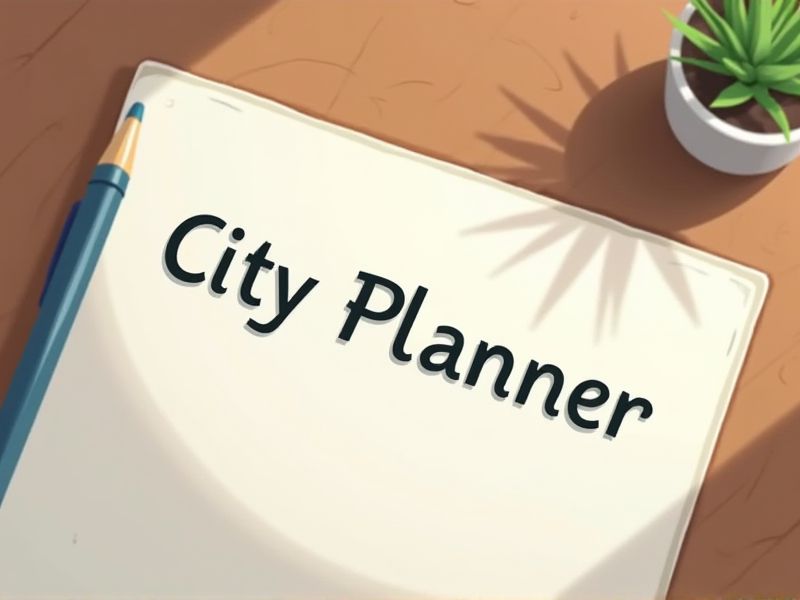
City planners play a pivotal role in shaping urban landscapes, requiring expertise in regulatory frameworks, environmental policies, and community engagement. Certifications ensure that planners possess a standardized level of knowledge and are equipped to address complex planning challenges. Obtaining certain certifications can enhance a planner's credibility and career prospects, aligning with industry standards. These are some key certifications that a City Planner might need.
American Institute of Certified Planners (AICP) Certification
The AICP Certification enhances a city planner's credibility by validating their expertise and commitment to ethical standards. The certification ensures that planners possess a consistent level of competence and skill, which is crucial for effectively managing urban development. Employers and clients often prefer hiring certified planners, as they bring assurance of professionalism and up-to-date knowledge in planning practices. Holding the certification can lead to increased job opportunities and potential for career advancement within the field.
LEED Accredited Professional (LEED AP)
A LEED Accredited Professional (LEED AP) helps city planners incorporate sustainable design principles into urban development projects, which can lead to increased energy efficiency and reduced environmental impact. Expertise from LEED APs ensures that infrastructure projects meet or exceed local and international green building standards, promoting long-term economic savings. With a focus on sustainable urban growth, city planners with LEED AP credentials can attract investment and improve quality of life for residents. Their knowledge assists in integrating green technologies and practices, fostering a resilient and healthy urban environment.
Geographic Information Systems Professional (GISP)
City planners benefit from a GISP because it provides spatial data analysis, allowing for informed decision-making regarding land use and infrastructure development. GISPs can enhance urban planning by mapping environmental impacts, which supports sustainable growth strategies. When analyzing demographic trends and population density, GISPs can pinpoint areas where resources and services are needed most. By offering visualization tools, GISPs enable city planners to communicate proposed changes effectively to stakeholders and the public.
Project Management Professional (PMP)
A city planner benefits from PMP certification as it equips them with structured methodologies to manage urban development projects efficiently. This certification ensures that planners can set clear objectives, manage resources, and mitigate risks, reducing project delays and cost overruns. It enhances communication and collaboration across multidisciplinary teams, crucial for large-scale urban planning. PMP also provides credibility and trust among stakeholders, facilitating smoother project approvals and alignments with city regulations.
Envision Sustainability Professional (ENV SP)
City planners increasingly require Envision Sustainability Professionals (ENV SP) to ensure infrastructure projects meet sustainability standards. The presence of an ENV SP influences city planners to incorporate environmental, economic, and social considerations into their designs, which leads to more resilient and livable urban spaces. Increasing public demand for sustainable development means city planners equipped with ENV SP expertise can effectively address community expectations and regulatory mandates. Access to the Envision framework equips planners with a structured approach to evaluate and enhance project sustainability throughout its life cycle.
Certified Economic Developer (CEcD)
A Certified Economic Developer (CEcD) brings specialized knowledge and skills that enhance city planning efforts due to their deep understanding of economic trends and opportunities. Their expertise in economic analysis can inform crucial decisions on land use, infrastructure development, and resource allocation. By fostering partnerships with businesses, they help attract investments and spur local economic growth. This focus on economic sustainability ensures that urban development projects are more likely to succeed and benefit the community long-term.
Certified Floodplain Manager (CFM)
City planners often face challenges related to flood risk management, and a Certified Floodplain Manager (CFM) provides expertise in this area, ensuring developments comply with local regulations. The presence of a CFM helps in effective risk assessment, reducing potential flood damage and minimizing financial losses for communities. Employing a CFM promotes sustainable urban planning by integrating floodplain considerations into land-use decisions. The expertise of a CFM enhances community resilience against flood disasters, supporting overall public safety and infrastructural integrity.
Certified Public Manager (CPM)
A Certified Public Manager (CPM) brings enhanced leadership skills, which can lead to more effective project management and decision-making in city planning. The rigorous training involved in obtaining the CPM certification equips city planners with tools for optimizing resource allocation, crucial for urban development. CPM knowledge ensures compliance with regulatory standards, reducing the risk of oversight in project execution. Obtaining the certification often results in improved communication and collaboration across departments, fostering a cohesive urban development strategy.
Professional Community Development Certification (PCDC)
Professional Community Development Certification (PCDC) equips city planners with advanced skills needed to address complex urban challenges effectively. It enhances planners' knowledge in sustainable development, fostering environments that balance economic, social, and environmental factors. Certification improves credibility, increasing job prospects and trust from the communities they serve. PCDC provides updated insights on regulations and best practices, enabling planners to make informed decisions.
Sustainable Urban Planning Certificate
City planners equipped with a Sustainable Urban Planning Certificate gain the skills to integrate environmental considerations into urban development, leading to more resilient cities. Data shows that cities focusing on sustainable practices report improved air quality and reduced carbon emissions, benefiting public health. The certificate provides planners with tools to effectively engage communities, fostering inclusive planning processes and equitable resource distribution. As urban populations rise, sustainable practices mitigate the impact of urban sprawl on natural resources, ensuring long-term livability and economic viability.
Summary
With your fresh city planner certifications, your expertise can lead to more efficient urban development strategies. These qualifications typically improve your ability to manage complex planning projects, which may result in increased job responsibilities. Enhanced skills and knowledge from certifications often increase your attractiveness to potential employers, potentially yielding better job offers. Your comprehensive understanding can promote sustainable development, benefiting both communities and local economies.
